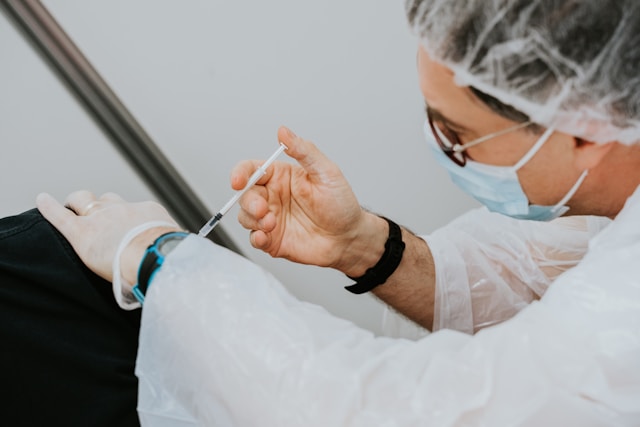Air travel can be an exciting adventure, but it also presents unique challenges to maintaining your health and well-being. Whether you’re a frequent flyer or an occasional traveler, taking proactive measures to keep healthy during your voyage is essential. From managing hydration to combating jet lag, here are comprehensive travel health tips to ensure you arrive at your destination feeling your best.
Plan Ahead with Fly Radar 24
One of the first steps in preparing for a healthy trip is using technology to your advantage. Fly Radar 24 is an excellent tool that provides real-time updates on flight statuses. By using Fly Radar 24, you can track your flight’s schedule, monitor any potential delays, and make necessary adjustments to your travel plans. This foresight allows you to reduce stress and avoid last-minute rushes, ensuring a more relaxed and healthier start to your journey.
Hydration: Keep the Fluids Flowing
Staying hydrated is crucial during air travel. The cabin air in airplanes is notoriously dry, with humidity levels often dropping below 20%. This dryness can lead to dehydration, exacerbating fatigue and discomfort. Here are some tips to stay hydrated:
- Drink Plenty of Water: Aim to drink at least 8 ounces of water for every hour you are in the air. Carry a refillable water bottle and ask the flight attendants to fill it up as needed.
- Avoid Alcohol and Caffeine: Both alcohol and caffeine can dehydrate you further. Instead, opt for water, herbal teas, or electrolyte-replenishing drinks.
- Moisturize: Use a good quality moisturizer and lip balm to keep your skin and lips hydrated. You can also use a nasal spray to keep your nasal passages moist.
Combatting Jet Lag: Syncing Your Internal Clock
Jet lag can disrupt your sleep patterns and overall well-being. It occurs when your internal body clock is out of sync with the local time at your destination. To minimize the effects of jet lag:
- Adjust Your Sleep Schedule: A few days before your trip, gradually shift your sleep and wake times to match the time zone of your destination.
- Stay Active: Physical activity can help reset your internal clock. Take a walk or do some light stretching exercises once you arrive.
- Exposure to Natural Light: Spend time outside during the day to help your body adjust to the new time zone. Natural light is a powerful cue for regulating your sleep-wake cycle.
- Melatonin Supplements: Consider taking melatonin supplements if you have difficulty sleeping. Consult your healthcare provider before using any supplements.
Stay Active: Move and Stretch
Long periods of sitting can lead to stiffness, discomfort, and even more serious conditions like deep vein thrombosis (DVT). Staying active during your flight can mitigate these risks:
- Stretching Exercises: Perform simple stretches in your seat or stand up in the aisle when it’s safe to do so. Focus on stretching your legs, back, and shoulders.
- Walking: Take regular walks up and down the aisle to keep your blood flowing and reduce the risk of DVT.
- Seat Exercises: Engage in in-seat exercises such as ankle circles, leg lifts, and shoulder rolls.
Nutrition: Eat Smart, Fly Smart
Eating the right foods can help you feel better and more energized during your flight. Here are some nutritional tips:
- Balanced Meals: Opt for meals that include a balance of protein, healthy fats, and complex carbohydrates. This will help maintain your energy levels and keep you feeling satisfied.
- Healthy Snacks: Bring along healthy snacks such as nuts, fruits, and granola bars. Do not consume sugary snacks and processed foods that can cause energy crashes.
- Small, Frequent Meals: Eating small, frequent meals can help maintain your energy and prevent digestive discomfort.
Hygiene: Protect Yourself from Germs

Airplanes are enclosed spaces where germs can spread easily. Practicing good hygiene can help protect you from illnesses:
- Hand Sanitizer: Carry hand sanitizer with at least 60% alcohol and use it regularly, especially after touching common surfaces.
- Wipes: Use disinfectant wipes to clean your seat with tray table, armrests, and any other surfaces you may touch.
- Face Mask: Wearing a face mask can reduce the risk of respiratory infections, especially during flu season or in crowded areas.
- Hydrate Your Eyes: If you wear contact lenses, consider using lubricating eye drops to prevent dryness. Alternatively, wear glasses during the flight.
Mental Health: Stay Calm and Relaxed
Traveling can be stressful, but managing your mental health is just as important as taking care of your physical health:
- Meditation and Breathing Exercises: Practice deep breathing exercises or meditation to stay calm and reduce anxiety.
- Entertainment: Bring books, movies, music, or puzzles to keep yourself entertained and distracted from any travel-related stress.
- Stay Connected: Keep in touch with friends and family through calls or messages to feel more grounded and supported.
Sleeping on Planes: Finding Comfort in the Air
Getting quality sleep on a plane can be challenging, but with the right strategies, you can improve your chances of rest:
- Comfortable Clothing: Wear loose, comfortable clothing and layers that you can adjust according to the cabin temperature.
- Travel Pillow and Blanket: Bring a supportive travel pillow and a lightweight blanket to help you sleep more comfortably.
- Eye Mask and Earplugs: Use an eye mask to block out light and earplugs or noise-canceling headphones to reduce noise, creating a more conducive sleep environment.
- Recline and Rest: Recline your seat slightly and use a footrest if available to find a comfortable sleeping position.
Using Fly Radar 24 for a Smoother Travel Experience
Fly Radar 24 is not only a valuable tool for monitoring flight statuses but also for enhancing your overall travel experience. By providing real-time updates on flight departures and arrivals, it helps you plan better and avoid unnecessary stress. Here’s how Fly Radar 24 can contribute to your travel health:
- Avoid Delays: By keeping track of your flight’s status, you can be alerted to any delays or changes in real-time, allowing you to adjust your plans accordingly.
- Plan Layovers: Fly Radar 24 can help you plan your layovers more effectively, ensuring you have enough time to move between gates, grab a healthy meal, or simply stretch your legs.
- Stress Reduction: Knowing the exact status of your flight can significantly reduce travel-related anxiety, helping you stay calm and composed throughout your journey.
- Informed Decisions: With access to up-to-date flight information, you can make informed decisions about your travel plans, ensuring a smoother and healthier travel experience.
Final Thoughts
Maintaining your health during air travel requires a combination of preparation, smart choices, and the use of helpful tools like Fly Radar 24. By staying hydrated, managing your sleep, staying active, eating well, practicing good hygiene, and taking care of your mental health, you can ensure a safe and healthy journey. Incorporate these tips into your travel routine, and you’ll be well on your way to enjoying a healthier and more pleasant travel experience. Safe travels!










Leave a Reply